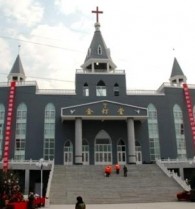Will China become the ‘world’s most Christian nation?’

From roughly 1 million members in 1949, the number of Protestant Christians in China has grown to well over 58 million today. That number is projected to rise to some 160 million by 2025, according to Purdue University sociologist Fenggang Yang.
When Roman Catholics are added to the projections, the number of Christians in China could exceed 247 million by 2030.
In a recent article in the Telegraph, journalist Tom Phillips points out that in spite of the dramatic growth, the prospects for the Chinese church are mixed. What happens to essentials of the faith in the closely monitored state churches? What about the future of the underground church? What does recent razing of several church buildings portend?
The new spread of Christianity has the Communist Party scratching its head.
“The child suddenly grew up and the parents don’t know how to deal with the adult,” the preacher, who is from China’s illegal house-church movement, said.
Some officials argue that religious groups can provide social services the government cannot, while simultaneously helping reverse a growing moral crisis in a land where cash, not Communism, has now become king. …
Ms. Shi, [preacher at Liushi church], who is careful to describe her church as “patriotic”, said: “We have two motivations: one is our gospel mission and the other is serving society. Christianity can also play a role in maintaining peace and stability in society. Without God, people can do as they please.”
Yet others within China’s leadership worry about how the religious landscape might shape its political future, and its possible impact on the Communist Party’s grip on power, despite the clause in the country’s 1982 constitution that guarantees citizens the right to engage in “normal religious activities”.
As a result, a close watch is still kept on churchgoers, and preachers are routinely monitored to ensure their sermons do not diverge from what the Party considers acceptable.
In Liushi church a closed circuit television camera hangs from the ceiling, directly in front of the lectern.
“They want the pastor to preach in a Communist way. They want to train people to practice in a Communist way,” said the house-church preacher, who said state churches often shunned potentially subversive sections of the Bible. The Old Testament book in which the exiled Daniel refuses to obey orders to worship the king rather than his own god is seen as “very dangerous”, the preacher added.
Such fears may not be entirely unwarranted. Christians’ growing power was on show earlier this month when thousands flocked to defend a church in Wenzhou, a city known as the “Jerusalem of the East”, after government threats to demolish it. Faced with the congregation’s very public show of resistance, officials appear to have backed away from their plans, negotiating a compromise with church leaders.
“They do not trust the church, but they have to tolerate or accept it because the growth is there,” said the church leader. “The number of Christians is growing – they cannot fight it. They do not want the 70 million Christians to be their enemy.”
Writing for Touchstone Magazine’s “Mere Comments” blog, Michael Avramovich provides additional information on the persecution of Christians in China.
China’s house church movement, which comprises approximately 90 percent of China’s Christians, endures unimaginable persecution, and the Christians are subject to regular crackdowns because house churches refuse to comply with Communist Party rules. During one crackdown in 2000 in Zhejiang province, where the city of Wenzhou is located, hundreds of churches and temples were demolished. However, what is unusual about [the current] dispute is that the Sanjiang Christian Church is obviously not a house church, but is registered with the local government. …
Today, China’s human rights record is among the worst in the world, and China’s government is among the most vicious opponents of the Gospel of Our Lord Jesus Christ. In 1949, Mao Zedong declared the establishment of the People’s Republic of China, and quickly sought to purge society of anything that would point to religion, causing China’s people to endure great hardship. Mao’s Great Leap Forward in the 1950s and the Cultural Revolution in the 1960s and 1970s, left tens of millions of Chinese dead or victimized. China’s system of “re-education” through labor camps detains hundreds of thousands each year without any hearing. China’s “strike-hard” policy is presented by the government as a crackdown on criminals, but it has been hardest on Christians. Today, through “strike-hard,” more Christians are in prison or under some form of detention than in any other country in the world. Yet, the Church in China grows, with thousands of Chinese coming to Jesus Christ every day. While Chinese Christians endure great persecution, it stands strong in its commitment to preach the Gospel of Christ no matter the cost. Please pray for the Christians of China. …
“China on course to become ‘world’s most Christian nation’ within 15 years,” by Telegraph correspondent Tom Phillips, is available online.
Michael Avramovich’s “Chinese Christians Defend Their Church” is available at the “Mere Comments” blog.


 May 1, 2014
May 1, 2014 







Trackbacks/Pingbacks
[…] the future is uncertain. the Humanities forum on Christianity and Culture asks, “what happens to essentials of the faith in the closely monitored state churches? What […]